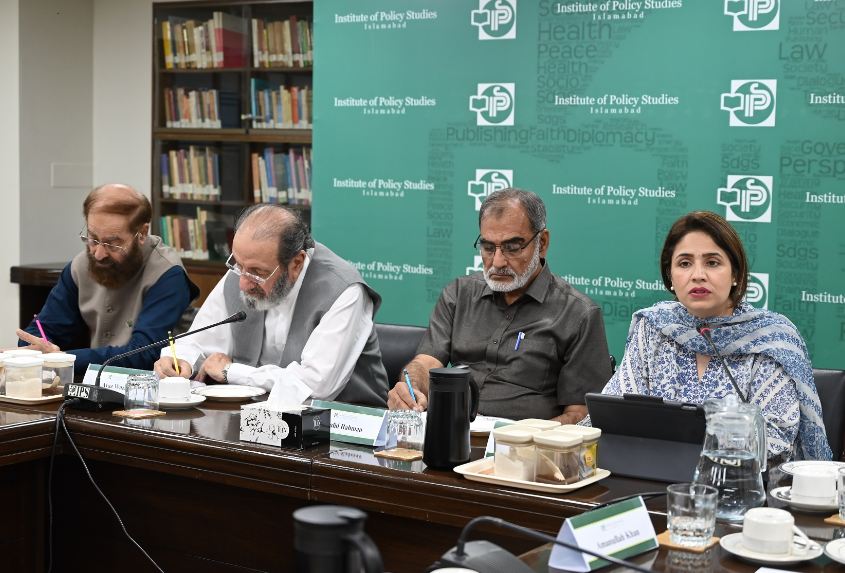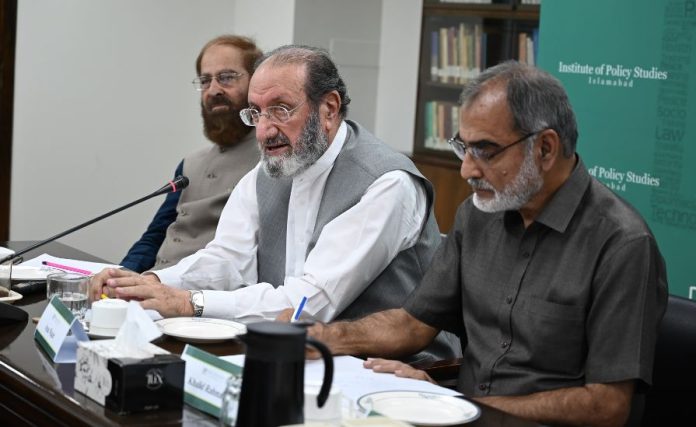ISLAMABAD, JUL 13 /DNA/ – Addressing the persistent trust deficit between Pakistan and Afghanistan is essential to strengthening the core of their bilateral relationship and setting it on a stable and sustainable path. Confidence-building measures that incorporate long-term, people-centric engagement and a coherent, integrated framework are crucial for both nations and the stability of the region. In this context, a strategic shift toward a ‘4P’ approach – prioritization, partnership, participation, and persistence – is a viable path forward.

This was discussed by former ambassadors, scholars, and researchers during a session on “Evolving Political Dynamics of Pakistan-Afghanistan Relations” at the Institute of Policy Studies (IPS), Islamabad. The session featured insights from Khalid Rahman, chairman IPS, Ambassador (r) Syed Abrar Hussain, vice-chairman IPS, Amina Khan, director CAMEA, Institute of Strategic Studies Islamabad, Ambassador (r) Ayaz Wazir, Brig (r) Said Nazir, defense analyst, Ambassador (r) Nasrullah Khan, Brig (r) Khurshid Khan, IPS associate, Tahir Khan, senior journalist, Dr Lutfur Rehman, author and researcher, Brig (r) Tughral Yamin, IPS associate, Dr Azhar Ahmad, IPS associate, Amanullah Khan, former member, RCCI, Sheharyar Khan, executive director, National Dialogue Forum, and Dr Sadia Sulaiman, assistant professor Quaid-i-Azam University.
Speakers emphasized that foundational tensions continue to strain bilateral ties. While the Taliban’s return to power in 2021 initially sparked hope for a more stable western border, this expectation was dampened by a surge in cross-border attacks by the Tehreek-e-Taliban Pakistan (TTP). Speakers noted that although the Taliban claim to have limited control over TTP, ground realities suggest otherwise.
The evolving governance structure in Afghanistan reflects a mix of authoritarianism and pragmatism, with the Taliban gaining de facto internal and external recognition despite lacking formal international legitimacy. However, their compartmentalized foreign policy, which engages selectively based on national interests, has limited meaningful regional cooperation and complicates diplomacy.
Speakers emphasized the need for a reset in bilateral relations, grounded in political will and pragmatic diplomacy. This includes addressing each other’s core concerns, security for Pakistan and trade for Afghanistan, and pursuing economic interdependence, refugee management, and regional dialogue through trilateral forums.
The relationship, they argued, has failed to evolve due to the dominance of the security lens and the absence of a genuine bilateral essence. To address this, a ‘4P’ approach was recommended: aligning ‘priorities’, fostering ‘partnerships’, enabling ‘participation’ of both peoples, and ensuring ‘persistence’ in engagement. It is vital to find common ground and invest in domains such as shared human capital. People-to-people contact, especially involving the global presence of Afghan alumni from Pakistani institutions, was highlighted as a practical tool to counter propaganda and build goodwill.
Media narratives and a coherent national story also play a critical role in shaping perceptions. In response, speakers called for independent media engagement, stronger public diplomacy, and a proactive role by Pakistani missions in Afghanistan to promote the country’s contributions to various sectors of Afghanistan.
Speakers concluded that Pakistan and Afghanistan must reorient their relationship around shared interests and mutual respect. A regional, rather than rigidly systematic, approach was considered more effective for achieving sustainable peace and cooperation.
Concluding the session, Khalid Rahman emphasized that local, regional, and global dynamics must be taken into account when addressing the challenges in Pakistan-Afghanistan relations. He stressed the development of an indigenous narrative rather than relying on a Western lens to interpret the Pakistan-Afghanistan enigma. Rahman underscored the need for a medium- to long-term strategy to build trust with Afghans, utilizing all available tools and remaining vigilant for opportunities. He also stressed confidence-building measures that highlight the cultural and social commonalities between Pakistan and Afghanistan. Such efforts, he argued, would foster a more meaningful engagement between both countries.

















